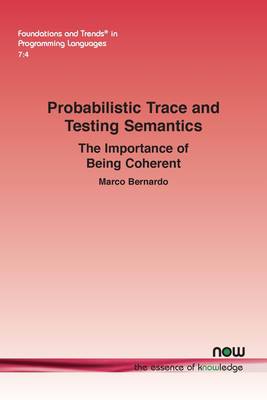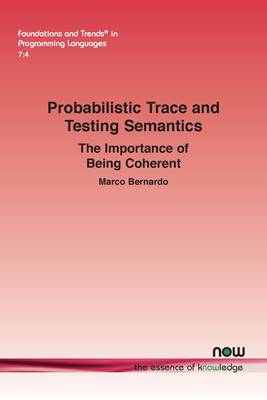
Door een staking bij bpost kan je online bestelling op dit moment iets langer onderweg zijn dan voorzien. Dringend iets nodig? Onze winkels ontvangen jou met open armen!
- Afhalen na 1 uur in een winkel met voorraad
- Gratis thuislevering in België vanaf € 30
- Ruim aanbod met 7 miljoen producten
Door een staking bij bpost kan je online bestelling op dit moment iets langer onderweg zijn dan voorzien. Dringend iets nodig? Onze winkels ontvangen jou met open armen!
- Afhalen na 1 uur in een winkel met voorraad
- Gratis thuislevering in België vanaf € 30
- Ruim aanbod met 7 miljoen producten
Zoeken
€ 101,95
+ 203 punten
Omschrijving
In this monograph, the author focuses on trace and testing semantics for nondeterministic and probabilistic processes represented by simple probabilistic automata. A trace is a sequence of activities labeling a sequence of transitions performed by a process, thus abstracting from branching points in the process behavior. A test is formalized as a nondeterministic and probabilistic process extended with success states or success actions, which is run in parallel with the process under test thus resulting in an interaction or testing system. Written as a comprehensive review of the topic, the author introduces the reader to the concept of nondeterministic and probabilistic models and how nondeterminism can be resolved. The author then considers probabilistic models, three anomalies of these models and how to overcome them. The author then addresses alternative characterizations of the two probabilistic trace equivalences. Finally, the author considers the anomalies of probabilistic testing equivalence and how to avoid them. This monograph is aimed at researchers working on the formal method aspects of programming languages.
Specificaties
Betrokkenen
- Auteur(s):
- Uitgeverij:
Inhoud
- Aantal bladzijden:
- 104
- Taal:
- Engels
- Reeks:
Eigenschappen
- Productcode (EAN):
- 9781638280743
- Verschijningsdatum:
- 24/08/2022
- Uitvoering:
- Paperback
- Formaat:
- Trade paperback (VS)
- Afmetingen:
- 156 mm x 234 mm
- Gewicht:
- 158 g

Alleen bij Standaard Boekhandel
+ 203 punten op je klantenkaart van Standaard Boekhandel
Beoordelingen
We publiceren alleen reviews die voldoen aan de voorwaarden voor reviews. Bekijk onze voorwaarden voor reviews.











